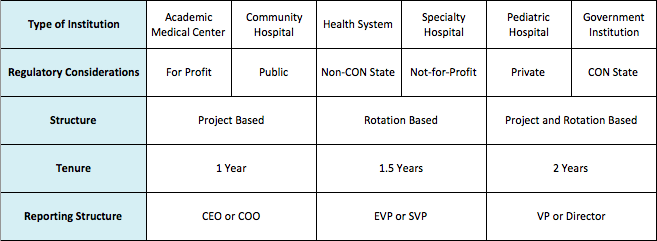- Joined
- Aug 19, 2002
- Messages
- 51
- Reaction score
- 0
Does anyone know how difficult it is for one to land an administrative fellowship after graduating from an MHA/MPH program?
Does anyone know how difficult it is for one to land an administrative fellowship after graduating from an MHA/MPH program?
A lot of factors at play in your question. Without knowing the candidate profile, the biggest factor is which fellowship? If you're talking about the more well known fellowships like Mayo Clinic, Cleveland Clinic, Johns Hopkins, then obviously those are going to be very competitive.
However, smaller academic medical centers or community hospitals often see less applicants, thus increasing your chances.
The VA also offers numerous fellowships as well. However, I did not apply to any VA fellowships, so I'm not well versed on their statistics.
What do they generally look for as far as candidate profile goes (e.g. GPA, experience)?
Competitive, although I've been told that just the monotony of the application process weeds a lot of individuals out.
I know someone who got one at a VA hospital..he said the key is your past experience. It is important to get a meaningful internship between the first and second year of your masters program. On a side note, he told me that he highly recommends applying for as many fellowships as possible. Not only are they a great experience, but many times result in a high paying job offer (~60k/year) after completion.
$60K is considered high paying?
I appreciate all of the thoughtful responses.
I did not realize that obtaining an administrative fellowship is so competitive. Do fellowships typically select individuals from highly ranked and accredited HMA and MPH - Management Track programs?
On a side note, what do the top 25 programs look for in a Master's applicant? I assume they look at grades, GRE scores, clinical experience, and research experience. Am I missing anything else?
Hi.
I am currently preparing an application to an administrative fellowship in June 2016 (application process next year).
I am a foreign applicant, MD with MHSA at an accredited University in Europe (well ranked university in Europe), high GPA (better at MHSA than in Med school though), working for 2 years as a clinical manager at the Physician-in-Chief office of a (top) academic hospital in Sao Paulo, internship at the WHO, research experience and publications in Health Economics, Black Belt LSS certification, Tableau and Programming Experience.
Recommendation letters would not be a problem , and I am preparing them early.
I believe my record is strong, and the visa will not be a problem, yet cannot stop seeing the international applicant label as a con.
May I aim for fellowships at the top Hospitals? And what can I do meanwhile in order to strengthen my application ?
Any admin fellow, alumni that can shed some light over here?
Thanks!
P.S. - No GRE score. Should I take the exame? GRE or GMAT? Thanks!

They are super competitive. Nearly all fellowship programs will want to see your transcripts, letters of recommendation, resume, and a personal statement.
After that, the large applicant pool (200+) will be narrowed down for first round phone interviews with current fellows. Most fellowship programs then extend offers to 6-8 candidates to visit them on-site, where they pay for your travel expenses and interview you for 2 days at the same time as all the other candidates. They usually make an offer to 2-3 candidates within 48 hours.
I was really fortunate to get a big-time fellowship out of graduate school last year. The thing that helped me the most was focusing on my personal statement. I also bought a book to help me with the whole process that was written by past-fellows, called "Hacking the Administrative Fellowship Process". I think you can buy it at their site.
I actually even paid them to review my resume and it was soooooo much better afterwards.
good luck!